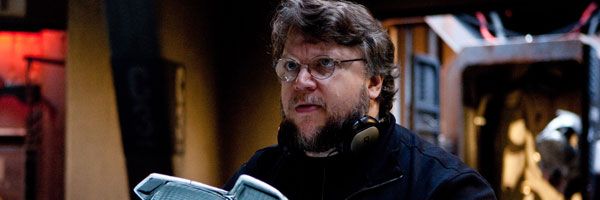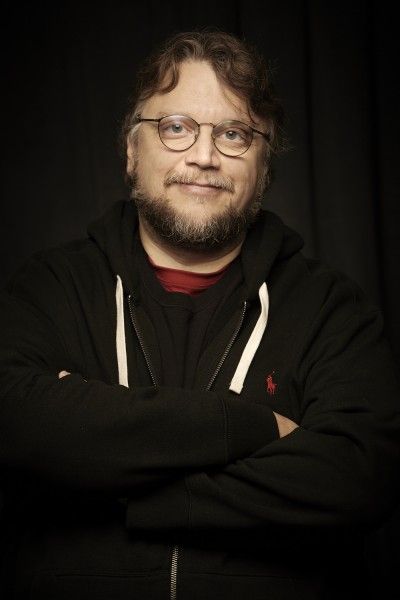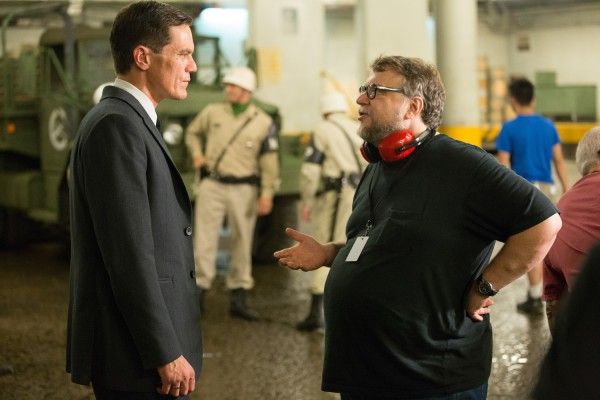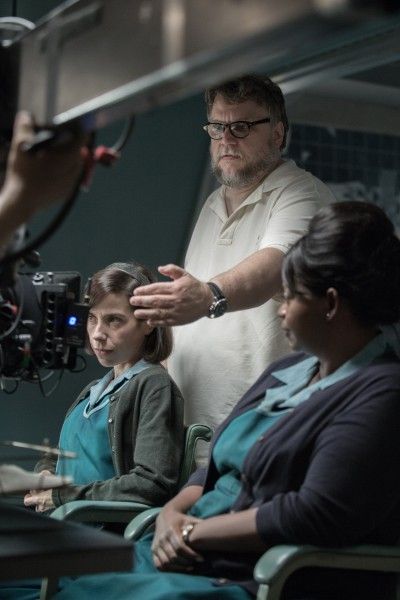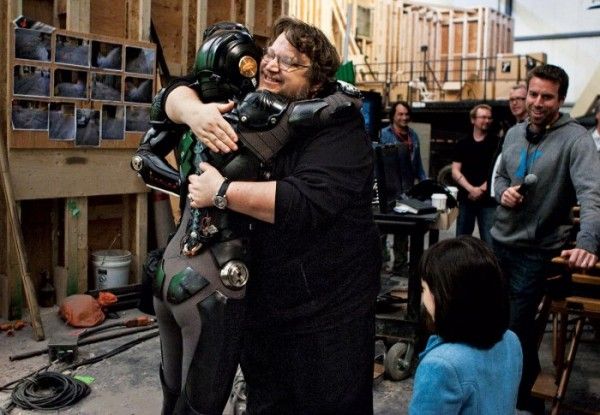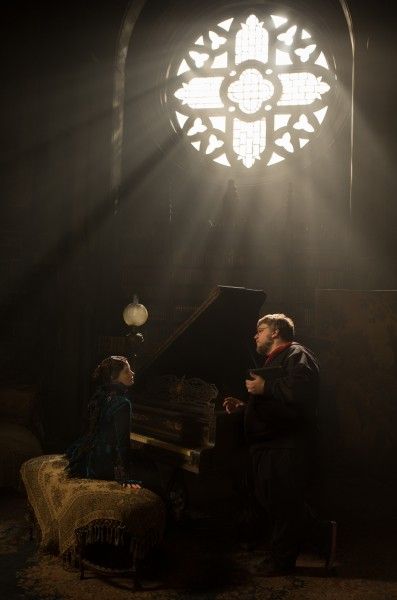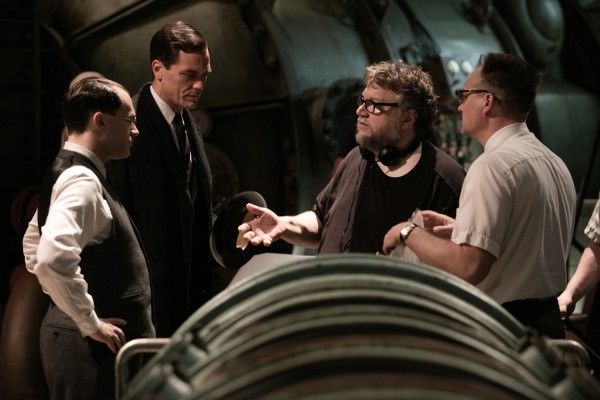After speaking with Guillermo del Toro for Mimic, The Devil’s Backbone and Pan’s Labyrinth, as well as visiting the Prague set of Hellboy—and watching the hulking, monstrous-looking titular character (Ron Perlman) laying the dead body of his beloved one-time firestarter, Liz Sherman (Selma Blair) on a slab—I came to the conclusion that the Mexican mega-talent is as genuine an artist as filmmakers come. And he remains so after winning the Venice Festival’s Golden Lion and best picture Oscar for The Shape of Water.
Del Toro was recently at the Marrackech Film Festival where he delivered a Master Class and gave select interviews. What follows below is our exclusive conversation, which covers everything from his thoughts on Netflix and Roma to his next project, Pinocchio.
COLLIDER: Given that your upcoming feature Pinocchio is being financed through Netflix, as was your friend Alfonso Cuarón’s Roma, there has been a lot of debate about Oscar-winning auteurs having their movies on the streaming site. What is your stance on this debate?
GUILLERMO DEL TORO: I think the landscape is changing and in the next five years it’s going to change tremendously. All the studios are preparing their own streaming platforms, so it’s not a matter of a single entity streaming at all. I’ve been trying to make Pinocchio for ten years and I’ve gone through every studio in Hollywood and they all said no. So whoever says yes I make it I with that person and I think it's the same with the Coen Brothers with The Ballad of Buster Scruggs and it’s true for Alfonso in the case of Roma.
I’ve loved watching movies my whole life. It’s interesting to note how when silent cinema became sound cinema everybody said it was the end of the movies and when television appeared they said it was the end of movies. When Blockbuster Video came into homes it was the end of movies. But they don't end; they change. There is a duty for us to keep telling stories and most important is the ambition of the stories we want to tell and the freedom that we have to tell them.
Are you afraid that Pinocchio won’t go to cinemas?
DEL TORO: I’m more afraid of not making it.
Why do you want to tell this story?
DEL TORO: As a kid I felt a kinship with the figure of Pinocchio, not in the happy way or a good boy way. I was very interested in whether he can be himself and be loved. Does he have to turn into a real boy to be loved? Why can he not be loved exactly the way he is? Why can we not be the imperfect children of loving parents? Those are the things I connect with.
So Pinocchio is a kind of hero for you?
DEL TORO: The beauty of Pinocchio for me is that he’s not a perfect creature. He’s a very difficult kid. But he’s a kid that learns the boundary between what he wants and others. He’s very much like Frankenstein: he’s a creature that's created through unnatural means by a father that he distances himself from and has to learn the ways of the world by failing and ache and pain and loneliness. So it’s very different from the way people usually perceive Pinocchio. I see him and I think Pinocchio is an oddity, a strange creature and I love him because of that.
Why are you using stop motion for the film?
DEL TORO: Because I’ve been an animator all my life. The first movies I made were stop motion with my Super 8 camera. I love the medium. That's why my first scholarship for students was to create stop motion in Mexico. In Japan there’s this beautiful theatrical technique called bunraku with puppets and there is a Greek theatre with masks. I think there is an abandonment to the avatar in stop motion that makes the figures more expressive and beautiful in the pantomime than if you did it with people.
After your Venice Festival Golden Lion and Oscar wins for The Shape of Water did you think you might be able to make all the projects you've been struggling with or have been unable to make in the past?
DEL TORO: First of all I weigh more than 300 pounds and I’m 54 so no. I can’t. There are about 20 projects and I won’t live that long. As a filmmaker you always exist in a realm of time and money and within a certain limit I can get a movie made. If I said I want to do Pinocchio for $85 million the answer is no because it’s Pinocchio set at during the time of Mussolini, a fascist dictator. So it’s not a film for all the family to enjoy.
So Pinocchio is going to be a political film?
DEL TORO: Of course. A puppet during the rise of fascism. But everything we do is political. We exist in a political environment. There are three layers to a story: the political, the way you organise the content/parable and there’s a deeper layer at the bottom that you don't see, where you create symbols in the melting pot of your subconscious and those you cannot control. That's the part that makes me emotional and I don’t understand why, but the other layers you try to at least organise.
Would it be possible one day to see a Marvel or Disney film with your signature?
DEL TORO: I tried to do, back in the day, Justice League Dark for Warners and we wrote and developed it and we had a script that I liked, because it was all monsters. I’m not interested in superheroes that aren’t monsters.
You’re a master at creating stories about the outsider trying to be accepted in society.
DEL TORO: Yes, it’s an essential sense that you get when you’re a child and I got it when I was a child. I felt like I didn't understand the world and I started understanding the world with monsters. I would go to Catholic Church and the saints made no sense. But Frankenstein made sense, The Wolfman made sense, The Creature from the Black Lagoon made sense. So I chose that as my religion.
Why did you and Alfonso and Alejandro González Iñárritu come up at the same moment as master Mexican storytellers with such strong emotion?
DEL TORO: Our generation came out of a brutal moment in the 80s where Mexican cinema was being suffocated. The cinémathèque was burned, supposedly it was an accident, but people say it was on purpose, and the Mexican government was basically against Mexican cinema and the cultural institutions were not favourable. We existed in independent cinema and worked for older directors. Alfonso was an assistant director, I was an assistant director and wardrobe designer/storyboard/makeup/ effects/boom guy. I did about 20 movies and Alejandro was doing commercials and on the radio. We were all trying to do different types of art. Then something happened. The unions opened up and we could make cinema at a professional level and we took it and ran with it. Alfonso and I we were always saying “the next movie will be our last” and that’s how we approached it.
Now it looks like Roma could win the best picture Oscar.
DEL TORO: The beauty of Roma is that you have a guy who wins the Oscar with Gravity, makes all the money in the world and that is his choice of next film. That is extremely beautiful. He’s not only told a great story in Mexico but in black and white. He’s told a story that nobody tells. It’s about his own childhood, but he didn't choose to tell it from the point of view of the kid. That movie moves me so much. It’s one of my five favourite movies ever made. It’s Number Five.
What are the other four?
DEL TORO: Frankenstein, The Spirit of the Beehive, City Lights, and Notorious. But they change every week.
What’s changed in your life after winning the Oscar and Golden Lion?
DEL TORO: First of all I didn't know I needed them so much until I got them! Then I was so moved. I was awash with a wave of love that was very powerful and then I thought this is the time to create scholarships. I thought this is the juncture to create things that will last much longer than I will. So I went to Mexico and worked on those scholarships and funding right at that moment. Other than that it was a very up and down year. My father passed away shortly after the Oscars. I’d taken a year off from filmmaking to be available to him, so it was a very humbling to see something as powerful as the passing of a person that is that important in your life at this moment. I think it puts everything in perspective in a beautiful, poignant way.
What did your father give you?
DEL TORO: I think this huge sense of discipline.
What is the most important aspect of your creative personality?
DEL TORO: Right now I’m co-writing a novel with Chuck Hogan (del Toro’s co-creator on The Strain) and I like how each of the mediums I’m working in is different. With a script you have to show everything with the camera and sound, but in literature you can maximise a moment of silence for a page and a half. So it’s very liberating. I do animation, I do live action, I do giant movies and I do small movies. Each of them is a little escape from the other.
You've also worked on video games.
DEL TORO: Video games are very different because you are sharing the control of the story with the player. The way you direct the player is for the player to have a sense of unlimited freedom--but it’s not real. You direct through things he or she cannot do that lead to a certain part of the story. So doing video games has been a very interesting exercise. We’ve been doing an animated TV series for the last two years called Trollhunters and we’re generating more than 100 episodes and lot of the agility you need to have in the storytelling came from developing video games. Each discipline gives you a separate tool for the other.
You’re doing the English-language remake of the 2017 Argentinean horror film Terrified for Fox Searchlight with the original director Demián Rugna.
DEL TORO: Yes, I’m producing it.
What kind of producer are you? How much of your own creativity do you put in those projects, what kind of ownership?
DEL TORO: It’s extremely important to make movies that you have a curiosity for, but that you know are not yours. Your job is to choose the director and I’ve chosen well almost every time. The times I haven’t, those are the difficult times.
Is it like when you cast an actor?
DEL TORO: It’s exactly the same thing. When people say, “he’s a great actors’ director,” that means 90% of the time you’ve cast the right actor. I wrote The Shape of Water for Sally Hawkins. Would the movie exist without her? I doubt it. That movie is as much hers as anyone else’s. It's the same with the director. When I produced The Orphanage with J.A. Bayona I gave him six or seven ideas. He took two. The other five I thought they were fantastic, but he didn't take them so I always say that this is my opinion. I learnt this because the best time that I’ve been produced was by Pedro Almodóvar with The Devil’s Backbone. He’d say, “These are my ideas but it’s your movie”. I loved it. I’d just made Mimic, which was very different, with The Weinstein Company. I said to Pedro, “I want final cut” and Pedro said, “What is final cut?” I said, “I get to cut the movie?” He said, “but you’re the director. Of course you get to cut the movie.” I started crying.
You’ve had success at creating movies that people connect with deeply.
DEL TORO: I’ve done ten movies and not all of them have been successful. But it’s the same impulse. I often say that success and failure live next door to each other. You’re knocking at the door and you don't know who opens it but it’s exactly the same experience. You never make a movie saying this is going to be a failure or success. You do it because you have to tell that story in your way.

